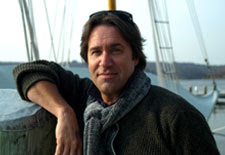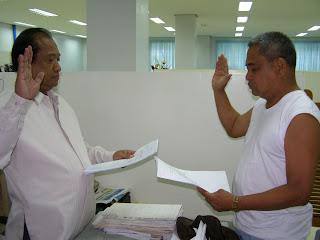The only elective official in the Philippines who is barred from seeking even a single re-election (for the same position) is the President.
The 1987 constitution states that "The President shall not be eligible for any re-election".
Those who are frightened at the prospect of an Erap-comeback will file this petition before the Supreme Court (just like what they did to Fernando Poe Jr.).
They will expectedly invoke the deliberations of the 1986 constitutional commission, that discussed this anti-Marcos paranoia of a provision.
Inherently, I don't like these and other "paranoid provisions" of the constitution because it restricts my God-given right---or gift--- of choice.
Perhaps, the members of the 1986 constitutional commission (concom) were of the thinking that in order to prevent the repeat of another overstaying President like Marcos, it should be best to put a provision barring re-election.
At first the 1986 constitutional comissioners decided a bar to "immediate" re-election.
In other words, initially they barred re-election of the President, but only in the very next presidential election immediately after his six-year term.
This meant that while the President will be barred from seeking re-election in the next Presidential election, he can still run in future Presidential elections.
But later on, this was put to an amendment by commissioner Padilla who proposed that the bar (on re-election) should be perpetual.
Then the concom placed the word "any" (before "re-election") courtesy of commssioner Davide, to emphasize that what the President is being barred is from running again for the same position.
The obvious reason for the bar, as can be seen in the concom deliberations, is that the President will only use the Presidency to somehow perpetuate himself in power.
So better to bar him from seeking re-election.
The seemingly paranoid commissioners said there should be a bar, forever.
The reasoning by commissioner Padilla (for a forever ban) is the Mexican experience.
In Mexico, he explained, the President there once belonged to a highly dominant, strong political party.
In the next Presidential election, while the Mexican President was barred from seeking "immediate" re-election, the President let his "tuta" (lapdog) run for President.
After the term of the lapdog president was over, the original President came back to power.
So, to avoid this, commissioner Padilla proposed that the ban against re-election should be lifetime.
Commissioner Rodrigo however, did not find commissioner Padilla's apprehensions tenable, arguing that the Philippine constitution, unlike Mexico, adopted a multi-party system.
This being so, the likelihood of a dominant political party having a stranglehold in presidential politics is remote.
When put to a vote, commissioner Padilla's proposal won.
But of course, when the matter of Presidential re-election ban was deliberated by the constitutional commission, they did not forsee the Erap experience.
Remember, Erap was unceremoniously removed from the Presidency only after two years in office.
So the reasoning of the constitutional commission for the lifetime re-election ban, i.e. that the President would only use his first term to prepare for the next election, or consolidate his resources, or to perpetuate himself in power, did not apply to Erap.
For how could Erap possibly prepare for the next election when he was already ousted at the early years of his Presidency, and he had no longer any control of the government resources?
As a matter of fact, he was imprisoned.
It can be argued therefore, and it is my humble submission, that the ban against Presidential re-election only applies to Presidents who were able to serve their FULL TERM of six years, or at least those who have served much of the six year term.
That is the only time that the President can adequately and influentially prepare for the next Preisdential election.
What are my bases for such proposition?
The deliberations of the concom iteself, and also an analysis of the commentaries of some authorities.
Erap can argue that in his case, the reason for the ban (on re-election) does not apply to his experience.
So, is Erap barred from taking a crack at the Presidency again?
I say not necessarily.
Don't you think so?




 Time has flown so fast.
Time has flown so fast.












